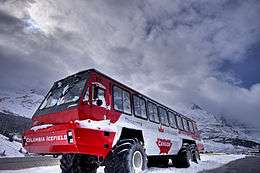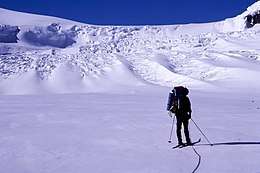Athabasca Glacier
The Athabasca Glacier is one of the six principal 'toes' of the Columbia Icefield, located in the Canadian Rockies. The glacier currently loses depth at a rate of about 5 metres (16 ft) per year[1] and has receded more than 1.5 km (0.93 mi) and lost over half of its volume in the past 125 years. Easily accessible, it is the most visited glacier in North America.[2] The leading edge of the glacier is within easy walking distance; however, travel onto the glacier is not recommended unless properly equipped. Hidden crevasses have led to the deaths of unprepared tourists.



The Icefield Interpretive Centre, closed during the winter (mid-October to mid-April),[3] stands across from the glacier. It is used as a lodge and for ticket sales for sightseeing on the glacier. Standard buses transport tourists to the glacier edge, where they board specially designed snow coaches for transport over the steep grades, snow and ice part way up the glacier.
The glacier is approximately 6 km (3.7 mi) long, covers an area of 6 km2 (2.3 sq mi), and is measured to be between 90–300 metres (300–980 ft) thick.
See also
- List of glaciers in Canada
- Athabasca
References
- "Athabasca glacier melting at 'astonishing' rate of more than five metres a year". Globe and Mail. Retrieved August 19, 2019.
- Parks Canada Agency, Government of Canada (23 October 2017). "Columbia Icefield Area and the Athabasca Glacier - Jasper National Park". www.pc.gc.ca. Government of Canada. Retrieved 4 February 2020.
- Columbia Icefield 2007 tour brochure Archived September 28, 2007, at the Wayback Machine
Further reading
- Kucera, Richard E. Probing the Athabasca Glacier: Case History of a Glacier in the Columbia Icefield [sic], Jasper National Park. Rev. and second printing. Evergreen Press, 1973, cop. 1972. 32, [2] p., ill. with b&w photos, graphs, and maps. N.B.: A bibliog. and the largest of the maps appear, respectively, on p. [33] and [34] (i.e., on the inside and outside the back cover).